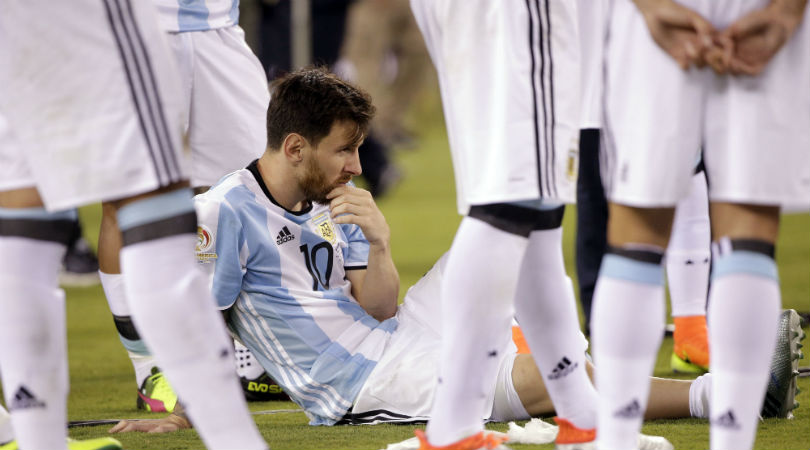Lionel Messi has never had it easy for Argentina – but quitting now is the biggest blot
Will he really call it a day for the Albiceleste? Martin Mazur tracks the international career of a national icon
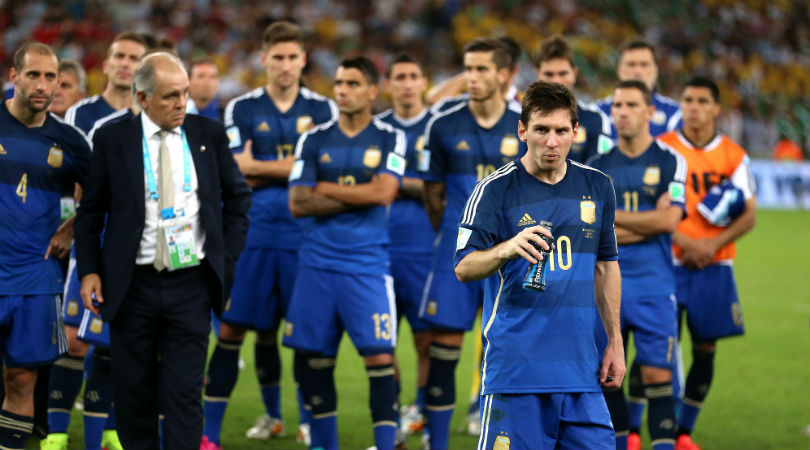
In Argentina, June 20 is not only a holiday but a very crucial day, as the country celebrates the creation of the flag. Or the Flag, as they call it, because it’s so important that it’s even capitalised in Spanish. It was created in Rosario exactly 175 years before the birth of Lionel Messi, not so far from the place the flag was raised for the first time.
Eleven years ago, not even the most optimistic person would have thought that the flag and Messi would become almost the same thing; that Messi would actually become a living flag of the national team, Argentina’s football ambassador and part of the country’s identity. A week on from 2016's Flag Day, on which he won his 100th cap in 2015, Messi has announced that he no longer wants to play for his national team anymore, after Argentina suffered penalty shootout heartache against Chile for the second year running.
What not everyone realises, however, is that Messi's international career has been fraught from the start: after all, it started in the worst possible way – with a red card after just 47 seconds.
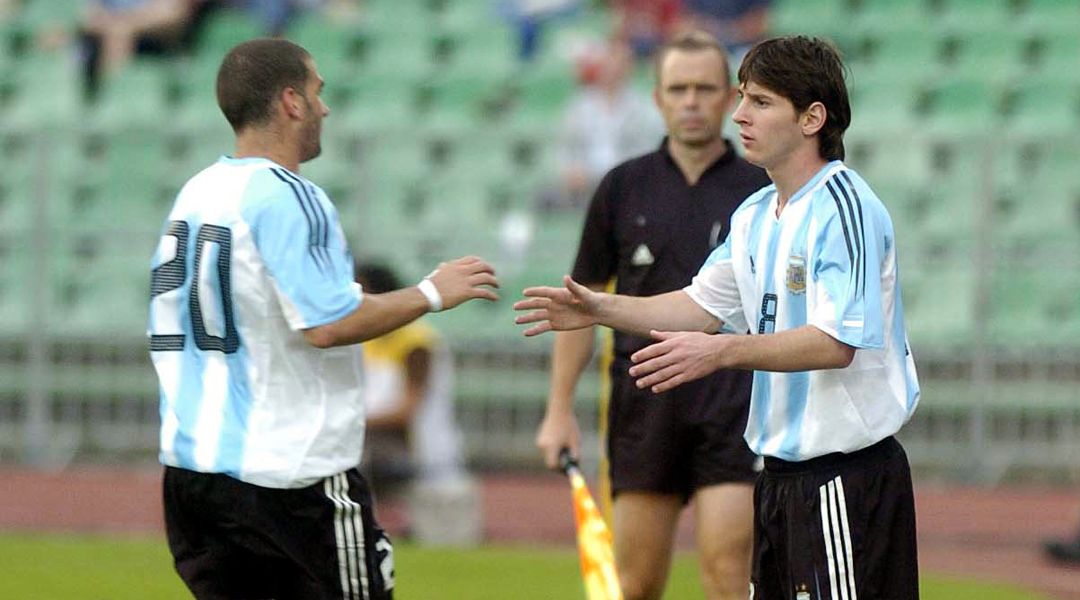
Following Diego
Hungary, the same country Maradona faced on his debut, couldn’t have offered a better way to keep the connection open
That friendly in Hungary was seen as a revelation to some of the early worshippers of the Barcelona wonderkid. Trying to link Diego Maradona with Messi has been a parallel (and rather popular) national sport for the last decade. And the coincidences started with the 2005 U20 tournament that Argentina won in Holland, which showed Messi as match decider and best player of the tournament, just like Diego in Japan 1979.
There, in Holland, the first conversation between the two took place. Maradona called the manager and asked him to put Messi on the phone. When he heard his voice, Leo froze. “I didn’t know what to say,” he revealed at the time. If Messi was still surprised by the recognition of the Argentine fans towards him, imagine how he felt about Maradona’s praise.
Hungary, the same country that Maradona had faced on his debut with the national team, couldn’t have offered a better way to keep the connection between past and future hero holding firm. Maradona was 16 when he replaced Leopoldo Jacinto Luque and earned his first cap, at La Bombonera in 1977, a year before the World Cup. Messi replaced Lisandro López against Hungary a month after turning 18, in Budapest, in 2005, a year before the World Cup.
Get FourFourTwo Newsletter
The best features, fun and footballing quizzes, straight to your inbox every week.
But all of sudden, only 47 seconds later, he was out again when Markus Merk showed him an unfair red card for supposedly elbowing Vilmos Vanczák.
Truthfully he only touched my throat, so I don’t think he should have been given a straight red card
“Everyone was looking forward to Messi stepping onto the pitch – it had been speculated that he would make his international debut and although it was still very early in his career, he was already very much in the news,” recalled Vanczák, who now has 79 caps, in an interview with FourFourTwoHungary.
“As soon as he entered the pitch as a substitute I fouled him: I pulled him back, but he was sent off for lashing out at me. It wasn’t a dangerous or strong example of aggression and truthfully not in a bad place as he only touched my throat, so I don’t think he should have been given a straight red card. I felt a bit sorry for him as I’m sure he never dreamt of this kind of introduction to international football. If I’m correct, he’s not received a red card since then,” the FC Sion defender added.
The red card was received as a kick in the teeth for Argentina. Messi, who'd stood out in the recent U20 World Cup, was still just a boy who feared to raise his voice in the dressing room. Actually, he only mumbled and never looked into the veterans' eyes. More experienced players like Gabriel Heinze and Juan Pablo Sorin approached him and comforted a devastated Leo.
Even Jose Mourinho, who would later become a sort of sporting enemy of Messi's, reckoned that the red card was exaggerated. “A yellow card was even controversial, it’s clear that he used his hand to remove the player who was grabbing him. Such a pity for the boy,” declared the Portuguese, who a few months later accused Messi of diving after a hard-fought Champions League match at Stamford Bridge.
Temper trap
I’ve lived many experiences and moments since I started, some of them positive and some hard, but all of them made me grow up
Leo’s shyness didn’t mean that his personality wasn’t strong. Over the course of the season, which ended with Barcelona’s Champions League victory, he raised his voice to president Joan Laporta and skipped the celebrations from the final in Paris – he was angry because Frank Rijkaard hadn’t selected him at least for the bench despite the efforts he’d made to be fit again, after picking up the first long-term injury of his career with a torn hamstring against Chelsea.
Later on that season he was spotted tearing off grass while his team-mates were playing against hosts Germany in the World Cup quarter-finals, visibly angry when manager José Pekerman decided to send Julio Cruz onto the pitch as his third and final subsitition. Argentina lost on penalties and Pekerman’s decision is still contested until today, but Messi’s behaviour was also brought up years later, as his performances for the national team weren’t remotely similar to the ones at Barcelona.
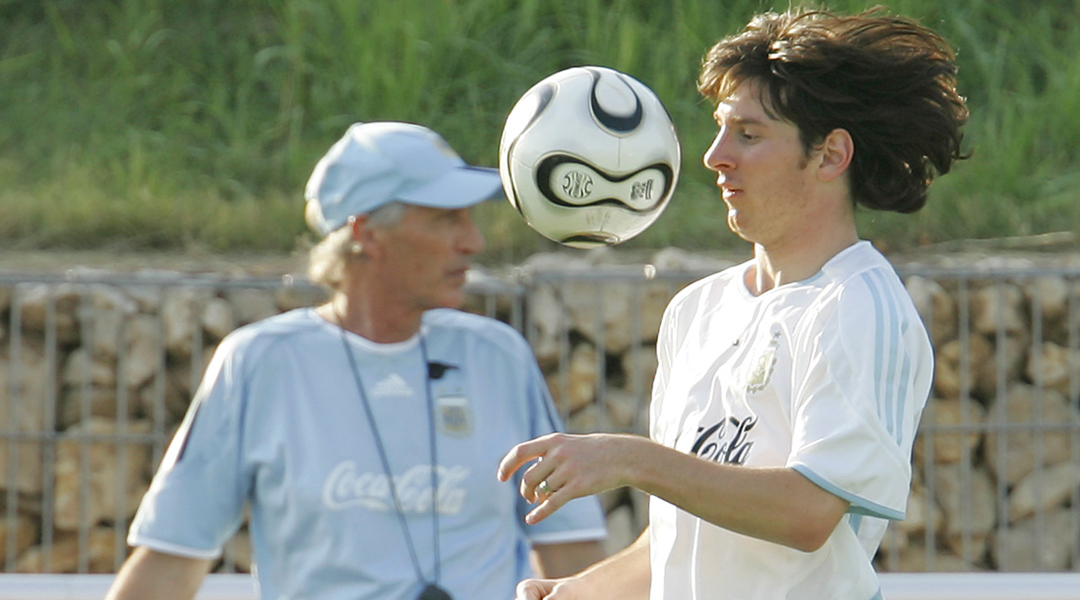
Messi’s national team career was full of thorns. During the World Cup 2010 qualifiers, his name wasn't even among the three most applauded by the fans when the lineups were announced on the speakers; in one game, even left-back Clemente Rodriguez received a warmer welcome than he did.
The Copa America 2011, played in Argentina, was a traumatic experience for Messi. The former No.19 and No.18, now carrying the No.10 shirt, was jeered by his own fans in Santa Fe a week after the opening match, a disappointing 1-1 draw against Bolivia. He finished that Copa America at home early in the quarter-finals, without scoring, and rumoured to be considering quitting the national team – rumours he’d never actually considered. He needed eight years to score in this competition again, last summer against Paraguay.
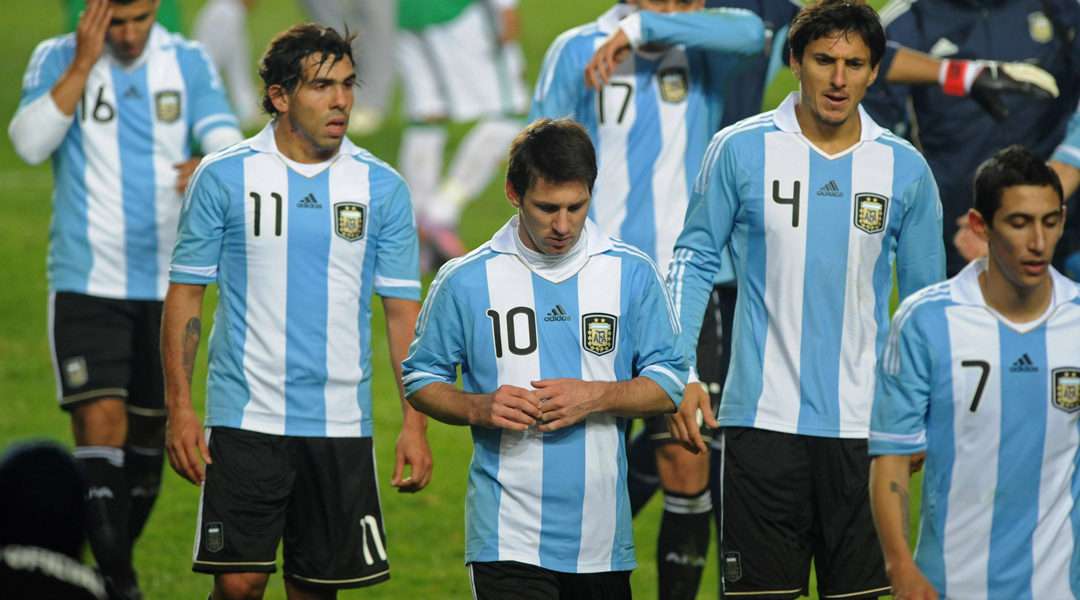
Before winning his 100th cap against Jamaica, Messi commented: “I’m extremely happy to reach such a landmark. I’ve lived many experiences and moments since I started, some of them positive and some hard, but all of them made me grow up as a player. I feel more experienced and mature now, and I hope that this time I can also celebrate a title.”

He didn't, and couldn't again this summer despite being a completely different Messi: someone who carries a World Cup final to his name, devoted chants, and complete supremacy in the dressing room. Someone who became more important than any manager, any tactical system and anything else.
Messi has now been a losing Copa America finalist three times with Argentina, adding to that 2014 disappoint against Germany in Brazil. But is this really the end? The 29-year-old has had it hard up to this point, but quitting now will only put a seal on his pain.
Vanczák interview: Zalán Bodnár.
